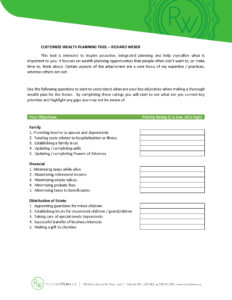
Do You Have An Estate Plan?
Estate Planning is of paramount importance when you expect to have remaining assets when you pass away and have family members, other individuals, or charitable causes that you wish to benefit from the property. However, people often procrastinate and overlook that they could potentially die prematurely, so estate planning isn’t on the front burner. A few risks to this approach is that your property may not be transferred as you intended and applicable taxes may not be minimized (so inheritances are eroded unnecessarily).
Undoubtedly, wills and Powers of Attorney (“POAs”) for financial and health care, prepared by an experienced lawyer, are crucial parts of an overall estate plan. However, lots of people we work with don’t realize, that wills and POAs are not the whole enchilada! There are other things to iron out, so let’s take a cruise through just a few examples.
In Ontario, “probate” tax (Estate Administration Tax) is currently levied at a rate of 1.5% on the value of the deceased’s estate (i.e. property to be transferred through the deceased’s primary will) in excess of $50,000. There are several ways we can identify to reduce exposure to probate tax to preserve estate value for beneficiaries.
The process to probate a will/settle an estate is as tedious for most people as watching golf on television, and can take up to a year or more. It can be cumbersome for the executor and beneficiaries may not be content to wait so long for their inheritance and may need it sooner. Hence, it can be beneficial to transfer eligible property in a simplified, prompt manner that bypasses the estate.
The will is public information so it is easy for anyone to find out “who got what” of the deceased’s estate which may cause tension involving individuals who feel they were shortchanged. It is possible to instead transfer certain assets discreetly.
Often, individuals do not wish beneficiaries who are financially irresponsible or minors to receive their inheritance as a large, lump (one-time) sum. Trusts can be an effective tool to instead facilitate receipt of a more gradual inheritance so they don’t easily blow their inheritance. Other planning strategies, without the complexity and initial and annual professional fees involved with a trust, are available.
Have you ever thought about the projected value, and composition, of your estate, which depends on the wild card of when you will pass away. Do you know what types of assets will be subject to final income taxes when you pass and at what likely tax rate? What would be the impact on your final tax liability if the tax inclusion rate for capital gains increases, as often rumoured? Has anyone ever calculated for you what your estimated final tax liability will be? Will there be ready funds available for your executor to pay this tax bill, which may be the largest expense of your lifetime and may arise suddenly? How will you treat your beneficiaries fairly if you have a business or other valuable asset that isn’t easily divisible among the beneficiaries?
Are you doing everything you can to resolve these types of issues and capitalizing on related planning? We excel at resolving these issues for forward-thinking clients, often in collaboration with their existing other professional advisors.


